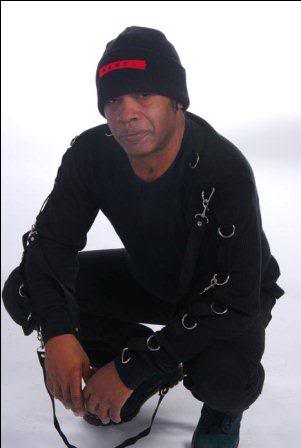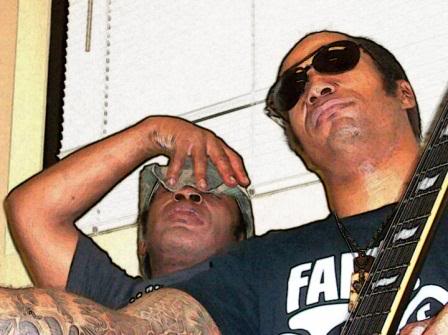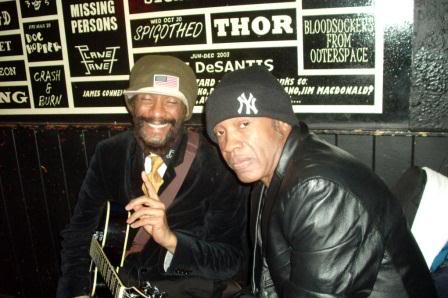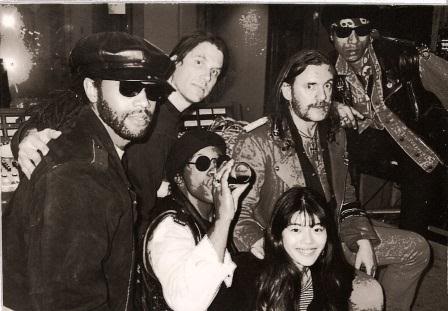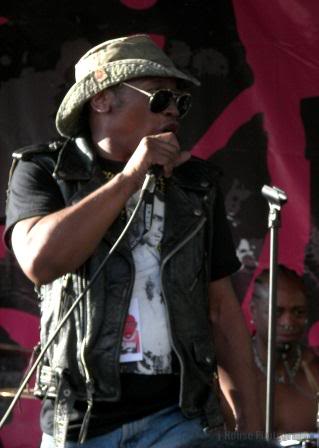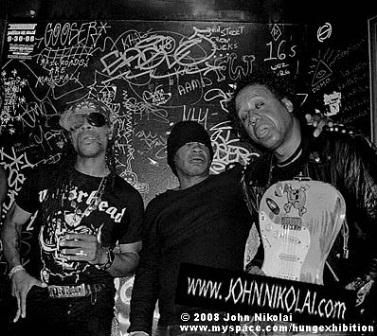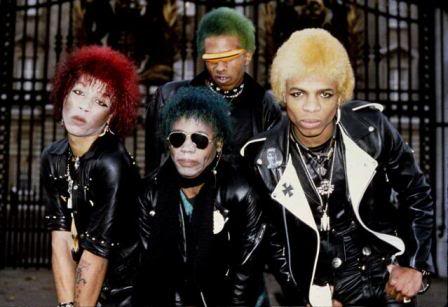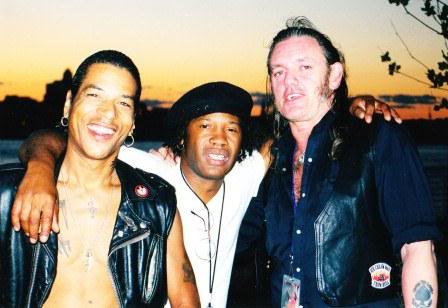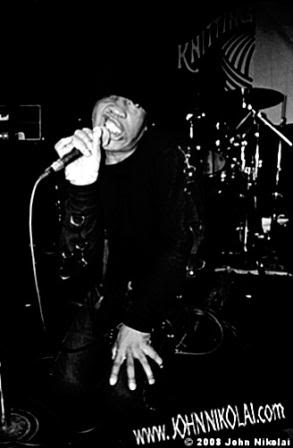|
Of PURE HELL
|
|
By: De Fen
|
|
I recently had the honor of speaking with Kenny "Stinker" Gordon, legendary front man for 1970s punk band Pure Hell. In this extended interview Kenny discusses his years with Pure Hell 1974-1980, the reformation of Pure Hell in 1986, his new project the GTX, the release of Noise Addiction some 30 years after it was initially recorded, epic tales from the 1970s punk scene and much more. Enjoy!
|
KSG- As far as political, pretty much everything that's going on in the world. I figure that if I die (everybody does) and there's no after life I'll feel like I've been screwed. This whole life with all the conflicts, politics, and people not being able to get on the same page. So much gets lost in translation. And musical influences? All of us. Everyone from the original sect of punk. In the 1960s we were all kids. So all the civil stuff that was going on, psychedelic and garage rock. All that stuff was new. I was open to a whole range of different genres, Hendrix and the electric stuff, experimenting with substances and growing up was all new. With us, we were pretty much exposed to all the music of New York, Philadelphia and a lot of imports too.
PG- Can you tell the readers about how Pure Hell formed and the move to New York where you shared a flat with The New York Dolls?
KSG- Me and Spider the drummer and Chip the guitarist we were all the musicians in my neighborhood in Philadelphia who were into the same form of music. That being, Hendrix, Pink Floyd, Syd Barrett and all that. You gotta think back, that was all fresh and new. It was a completely different era. We were some of the few who were advanced enough to be into that kind of music at that time. We were like 17 when we decided to get together. So we rehearsed. This is like '73 or '74 and Patti Smith and Television were the first to play CBGBs when Hilly Kristal was running it. This was the beginning of punk. People like the New York Dolls were on the scene in '74. In fact, one of our agents over in England had brought the Dolls over to England when Billy Murcia died.
We all moved out to New York in '74 when I was only like 18 or 19 coming out of college prep school, actually I left it early in order to go. It was really going on at that time. Anyways, we basically formed and then very shortly after in '74 when we took our first trip up to New York and Spider had known Johnny Thunders from going to shows in Philadelphia so we started hanging out with that crowd. From listening to the Dolls to doing everything that we were doing with our band itself we ended up in the company of those guys. So about '74 we moved up and Television were rehearsing in the New York Dolls loft which was a couple of doors down from the Chelsea. We ended up renting a U Haul truck, putting all our equipment in it and moving right into the Chelsea. The Dolls had just gotten kicked off of Mercury Records so Malcolm McLaren and Vivienne Westwood were trying to keep them afloat before they completely broke up. You know, with that red patent leather thing that was going on. Actually, Jerry Nolan was in rehab and Arthur Kane was a heavy alcoholic so they had Peter Jordon playing bass and Spider sat in on a couple of shows. One of those shows was the Hippodrome where they did their red patent leather show, which was one of their final shows as a whole before they went down to Florida and broke up. That's when Johnny and Jerry formed the The Heartbreakers, then they had Richard Hell, as I said they were all rehearsing in the loft as well. So we were all right there in the hub of everything in New York. Now, looking back to the actual beginning of everything. This was even before Malcolm went back to England and put the Pistols together.
KSG- After our initial move to New York, our first shows were at a club called Mothers. You had certain clubs. You had the Mercer Arts Center, which I think it kinda caved in, you had Max's. It was a little bit of everything. You had the artsy, Warhol scene and you had the punks mixed in. Then CBGBs was more of a raw, dinky kinda bar. We were beginning to play around the scene there. Blondie, The B52s, The Dead Boys were all new. People were coming from all kinds of other places to be a part of it. I remind you that Stiv, Joey Ramone, Johnny, were all about 6 years older that me. The Dolls really took to us. We were rare as I would guess. We were sort of the negatives to what they were. They were playing the R and B stuff. We were coming across as liking the more British music so it fit like a glove so to say.
So, we're there in the Doll loft and this was where we got the idea for our first single which was released in the UK. We were in the loft jamming and 'Boots' was one of the songs we'd play with johnny. So we just kept that in our repertoire when we recorded with Curtis. That became our first single release in Europe. So, '74 we initially went to New york and by '75 the Dolls had broken up. We met Curtis Knight around '76 or '77. Him being affiliated with Jimi Hendrix fit. At one point Curtis had Hendrix as a guitar player in his band The Squires. Right off the bat Curtis was saying that we were going to go on tour really quick. So he started managing us and we recorded the first album, 'Noise Addiction' which was finally released around 2006. With Curtis we began planning to go on tour, but that was only after we had played with Sid.
PG- So, in 1978, as Pure Hell was about to embark upon the European tour, Nancy Spungen was found murdered and Sid Vicious was being brought up on charges. How did this event impact the punk scene at the time?
KSG- So we have Curtis Knight planning our European tour. We had played some shows with The Dead Boys in Philadelphia at the Hot Club. Our tour is now set. Curtis went over beforehand prepping the press for us. Sid and Nancy had just moved over to the states after the Pistols had broken up. Nancy was someone Spider knew from school back in Philadelphia prior. Anyways when Nancy and Sid arrived, were all in the Chelsea and Pure Hell had been booked to play some shows with Sid, we had a few knights and The Victims had the other two nights. I never visited their room during the time we were playing. That little room where that happened. Between the time that we played with him they had caught their mattress on fire. As far as I could see they were on a decline. The Pistols had broken up, Sid was going on his name which was undeniable. When you say "punk" you're talking about The Pistols, The Ramones, The Dolls...the people who made the mark.
So after Nancy and Sid got there, Spider and I were back in Philly prepping to go on tour. This was October of '78. Spider and I were in a car going to Delaware when we heard "British punk star wanted for the murder of his girlfriend" on the news. We couldn't believe it. Then, to find out that it was in room 100 that they had lit their mattress on fire. The Chelsea at that time was so completely different from anything and New York isn't what it used to be. A graveyard shift of life would take over at night. All kinds of things would go on at The Chelsea. I just wrote something in Kathy Knight's (Curtis Knight's widow) book. She had written that people were getting thrown off the roof there...something to do with Jimi. So yeah. We heard the story like that and couldn't believe it. Shortly after, when we got to Europe we had all our photos in the press. Photos of us with Sid, pictures from sound check with him, Jerry Nolan and Steve Dior. So when we got to Europe we had ITB booking agencies, The Kinks, Dolly Parton, WAR, and all kinds of major stuff happening. It got kind of screwy because independent labels were just popping up. Curtis wanted our music to go through his Golden Sphinx label and he wanted to have reign over much more than was needed. Then we had a spat over some girl in Holland and he threatened to cancel our debut in England. Me and Spider said, "I don't think so." So that's when we started talking with Roy Fisher who had brought The Dolls over previously. We told him what was going on with Curtis and after some of our shows there, Birmingham, The Barbarellas, The Music Machine in London. Those places were all packed. Unfortunately, we had to let Curtis go. We did it in a covert way. Roy had gotten a lawyer. We let Curtis think we were meeting at the airport and switched flights after he was on the plane. The way I see it, Sid was in a stupor and Nancy was a real needler. She had this "Don't you know who we are" kind of and attitude. As far as I know she could have done something to where he done that, passed out and then woke up. Who knows? But...I was just in Alan Parker's documentary 'Who Killed Nancy.' They go over with all these scenarios and loose ends. We weren't even there when that happened. That happened about a week after we played with them. They were in the room that we were in when we played Max's because they had caught their room on fire. I was talking to Gidget Gein (bass player for Marilyn Manson) before he died around Halloween 2008. I was talking to him about possibly joining me, and a buddy of mine, to play bass with us for the New York premier of the film. He was up for doing it and before it went any further, he O.D.'d. Anyways, he was telling me that he had Rockets Redglare's manuscript to a book he was writing and in it he talks about the night that Nancy was killed. And then in Alan's film, some of the curiosity is around Rocket Red Glare, which my friend Sturge defends that it wasn't Rockets because there were too many people there. Sid was a really nice guy. So much has gotten lost in translation...like the swastika t-shirts. I even had one that someone had given me once. We were all about anti-racism. All the punk kids were against that. You had your national front people, but they were completely different. After the thing with Sid, even The Dead Boys had split, there was really only Stiv and Cheetah. Stiv was doing The Wanderers with some of the guys from Sham 69. Some of those guys got together later and formed The Lords of the New Church. So, The Dead Boys had broken up. The Ramones were having problems and not satisfied that bands weren't being the recognition that they should. Blondie didn't like it when Madonna got big cause Blondie was the original new wave girl with the fashion and everything. Things were starting to break down around '78-'79 after our initial tour.
KSG- Yeah. But people who don't know or were never around it have no idea the history of what The Pistols and everybody was about. In Europe, the kids were living under a monarchy with a bad economy and they were serious about 'God Save The Queen' and such. That was Malcolm's influence, to be political. He sort of designed that. He was a fashion designer.
PG- What was the audience reaction to Pure Hell on your first European tour?
KSG- It was all positive. Nothing that anyone could deny. Our performance was how we got there in the first place. Chip, the guitarist would do the Hendrix sort of antics. It was new. Many others were trying to be Johnny when these were the guys that put us out there. It was a good response. There was a lot of anti-racism stuff going on. We had the attention of all the press and the record was #6 on the alternative charts. Going to boat parties with people like Chrissie Hynde and Poly Styrene. Rose Taylor (Mick Taylor from the Rolling Stones ex wife) and her little daughter Chloe were staying at our flat. It was really cool, the response.
But you know, people will say that when the Pistols broke up that the original tier had died. So, The Pistols broke up and then the murder of Nancy, that really scared and shocked a lot of people. That was pretty real and raw for someone as public as Sid. And what it stood for, all the anti-establishment leanings. They were trying to break that up anyways. That was a pretty sad mark. I don't know if you wanna call it murder, but that's what it looked like. Kind of gave punk a black eye that they were trying to give to it anyways. It was a little bit to late though. We couldn't see it then, but The Pistols were to be inducted into the hall of fame even though they refused it. Blondie, and all sorts of people from my generation have grown and evolved into what it is.
PG- How did you meet Lemmy?
KSG- On our first European tour we met Lemmy from Motorhead. I didn't understand what was going on at the moment, but us going over there with Curtis Knight and the Hendrix connection...See, Lemmy had readied for Hendrix either right around the time he was in Hawkwind or just before Hawkwind. Then there was "Fast" Eddie Clarke who had played lead guitar in Curtis Knight's band Zues before he started playing guitar in Motorhead. I just want to make this point because people wonder: "Well, didn't he go into something that was not punk?" But it's not true because in '77 Motorhead was on the Various Punk and New Wave compilation with Richard Hell, The Damned, etc. Also in '77, Lemmy had played a few shows with The Damned to help them out. In fact, Lemmy played a show with The Damned about a year ago too. Many people don't know this. Lemmy and Motorhead were punk when it was beginning and considered that way. They happened to become big in metal and that's just how it is. A lot of the other bands, like Metallica took his influence. Anyways, when we came over there there were already so many connections between Lemmy and Pure Hell because of Curtis Knight as I mentioned. As I say, it's just one long interconnected string...
KSG- At that time I felt satisfactory with what we had done and didn't see the point in declining or going backwards. I figured, drop it or leave it be if it's not going forwards because that was the whole point to begin with...to go forwards. After going there and doing what we did that's what we had to deal with. It wasn't happening as it was before we left New York. When we got back, by 1980 one of the final shows we played was at Max's where Cheetah sat in on a few songs with us and then we just dispersed after that. Then I got married. So I was married and then divorced in a few years...heh heh.
PG- Then in 1986 Pure Hell reformed. Can you tell the Punk Globe readers about that?
KSG- Spider had called me because he wanted me to come out to L.A. again. This was around '86. So that's it. I came back out to Los Angeles around '86 and we began. Spider was living on Holloway Drive at Sunset Blvd., that's right around where Tower records used to be, close to The Whiskey. So Spider was living over there, Mick Cripps and his brother Robert, Gore Galore and Tracii Guns and a bunch of other people all living in the same apartment building right there on Holloway Drive.
We were back and fourth for a while but by 1989 Mick Cripps had us at 4th Street Recording Studio. We went back and fourth between Holloway Drive and 4th Street. I was taking some fashion courses at the time. Anyways, Mick Cripps started recording and producing some stuff at that time. So we recorded some stuff with Mick and then we recorded some stuff with Lemmy. I remember the L.A. riots were going on at that time. We also did some independent television show for Club Spice. This guy was shooting a T.V. show and it was about a week he was looking for different people. Ernie from Body Count was there at one point, but Lemmy was there too. So we rekindled with Lemmy what we had in '78 and we recorded a couple things that have yet to be released. We also did some gigs at the Club With No Name with the Ultras. Mick Cripps had some side projects going on with The Waterboys from England. This was around '92/'93 when the L.A. Guns were going through their down slide. I remember Riki Rachtman who had a show on MTV, he had a show he was doing at Peanuts at that time. I don't know if you know these places this was Santa Monica Blvd., I think Peanuts was over there, all this was around '92-'94. There was something going on called the Club With No Name because it would always be in a different location, sort of how The Masque started. I remember playing a show with Steve Jones when he had a band called Fantasy 7 at the Club With No Name back then. So that was pretty much us getting back together post 1978/79. It was basically done out in L.A. Then we had Mick who had Charlie Clouser come out to the east coast and we recorded a couple of things in Long Island, N.Y. Then, in 2002 my drummer Spider died of pancreatic cancer.
KSG- Noise Addiction was originally recorded when we first met Curtis. It includes the first single 'Boots' and then 'No Rules' We only got to release the single in Europe before things started falling apart.
It wasn't released until 2006 on Welfare Records out of Boston. When the album surfaced back up and was re released I was like, "Oh my God. Whose listening to the stuff that I wrote when I was 18?" I was surprised with the feedback and now with the Internet everything is different. Henry Rollins, thanks to him and Ian MacKaye saying we were like the Maltese Falcon. Henry was actually in our audience in L.A. at the Masque when we played in '79 which was next after our first European tour. As far as it being lost all those years, that was due to the abrupt break up with Curtis. Curtis had possession of the masters and a lawyer and we were trying to break contract with him which we couldn't do. So after Curtis had split, we're still there. We had recorded a few things with Tony McPhee members were either homesick or tired of the stress and pressure. Curtis did try to get back together with us after Spider and I had gone back out west. Quite frankly, he pulled the same rigmarole when Eddie Clarke went to join Motorhead. I don't really want to say anything too bad about him because he did help to make our name early on. Anyways, Kathy Knight had had the masters for all those years. Curtis Knight died at the end of 1999 and around 2005 she started putting up all the old masters up for sale. So these guys from Boston bought it and put it out which was pretty cool. At first, like I said, I was like, "Oh my God. Who has that old stuff?" But the response was really good. Henry Rollins was doing that radio show Harmony In My Head on Indie 103.1 out of L.A. Then there was the whole late '70s punk reunion and Swindle magazine wanted to do an interview. It's a shame that Spider isn't here because he was one of the main forces of the primary Pure Hell. With Noise Addiction coming out like that it sort of introduced us to people who may not have known as much about us as they did The Bad Brains for example.
PG- Can you tell the Punk Globe readers about the L.A. punk house in the Alhambra Desert?
KSG- We came back at the end of '78. By February Stiv and Cheetah called us to come out to L.A. So they flew us out. We were all staying in all these trailers with these French people that were trying to do something to do with organizing against war. They were doing a lot of coke. There was a guy in a wheel chain and Nicky Beat...We're out in the Mojave desert, they had all these trailers and a studio where they were building miniature models for films out in Alhambra somewhere. They had about eight trailers, all kinds of people went through there.
Then there were crabs all over the place. So you got cocaine, warm Los Angeles air and breeding crabs. I don't know who left them. Then the crazy French people...this little old guy in a wheel chair and Nicky Beat and this was right before he started playing drums for The L.A. Guns...Anyways, I remember Nicky Beat talking about how he wanted to push the little old guy over a hill...heh, heh. It was a lot of fun. Something you would never see again. Imagine the whole scene from the Masque right in the middle of the Mojave desert. There was The Cramps, Pure Hell, The Dead Boys, and many more in the little desert town. What would you call that? A camping ground? I don't know. It seemed like a circus to me. There was a motor cross track and I got on a bike and started riding around and there were these kids from the desert and they're looking at us like we're the invasion of Los Angeles coming in there. After the desert we went back to Europe again. The second tour was good as well. The highlight there was playing The Glycium with The U.K. Subs. I didn't know them then cause who I knew were the kinda first wave people that came up initially. At that second stage things were really dying out for punk. Sid had died, then Darby Crash died. Some people continued on, like Joan Jett getting Sylvain's band The Criminals who later became The Blackhearts. Though, for the most part, the initial punks had sort of broken down around 1980.
KSG- The Masque was like CBGBs for the west coast. You had The Avengers, The Mau Maus, The Germs, and all those L.A. bands. We played The Masque on the closing date for the other Masque. That was the original Masque on Cherokee above Vine in Hollywood that Brendan Mullen opened. Anyways, we played in February of '79 with The Dead Boys, The Cramps, Wall of Voodoo, The Germs and The Extremes. It was so packed in there that night. Darby Crash was getting dragged around cause he had passed out. I just remember these big black boots being drug around all night. That was a great show. All of the bands that played were friends, everyone knew each other.
PG- Do you have any thoughts on the Afro-Punk Movement? Thoughts on James Spooner's documentary? Thoughts on the festival?
KSG- Well, you hear what I'm talking about. I'm talking about ground zero, right? As far as I'm concerned...you know, Curtis Knight used the ploy, "The First All Black Punk Band" which in a way is true. You see these bands like Death that are coming up now. The Bad Brains came right out of Washington. There were definitely other people who were black and punk and it was no big thing on the inside. People have always been influenced by the rock-n-roll of Chuck Berry.
But afro-punk...when did that come about?
PG- Some have it that the Documentary started the movement. It's really difficult to say...
KSG- I'm gonna say 2000 or so. My point is that that didn't exist from where we came from or what we're about.
KSG- Yes. Before Spider passed away we were talking with Darryl from The Bad Brains who had a house up in Woodstock. Spider and I were contemplating doing some recording, possibly to compile with the recordings we had done with Lemmy. Then the guy from The Psychedelic Furs also suggested we go up to Woodstock and get with Darryl.
Anyways, James Spooner, who made the Afro-Punk film was trying to get a hold of me right around 2002 after Spider had passed away. So he was getting a hold of me and then Bob Gruen for photographs. Spooner ended up interviewing us a bit at Spider's memorial in Philadelphia. We also did something at a place called Brownie's in New York and he filmed that as well. You know, we may be subject matter in there but that's pretty much it. We were asked to preform at The Brooklyn Academy of Music Festival in 2009. So we played that. It was a whole week of film, arts and entertainment. Afro-Punk also had their thing going on there. I mean, you can't deny it if they're Afro-Punk and they're talking that but the all black punk bands like Pure Hell, Bad Brains and then Death and so on were always classified under the genre of punk. People have been wondering: "How come you're not doing anything else with afro-punk?" You know, I'm here and they're there. That's not my goal. There is definitely a lot of great new talent that I would think is just a part of this whole new century. It's not just Hip-Hop or Punk Rock now. Well, it is but you have a lot of fusion now. I see kids who could be my kids. One of the bands of the top of my head, The Objex out of Las Vegas have a solid thing going on. There's not really a whole lot I can say about afro-punk, it's not like I've got a hand in heavy or anything like that. Are you familiar with the scene in New York?
PG- A bit. Though, as far as what's going on now I'm definitely more in touch with Southern and Northern California.
KSG- Do you know groups like The Dirty Shames?
KSG- I consider them the new kids on the scene bringing it back to Manhattan cause a lot of things have been going on in Brooklyn. You know, this is how I see it from just looking in it. I don't hang out like I did 20 years ago. Anyways, I just did a show with Lisa Lush and The Victims. We had plans to do a show at Webster Hall with Bobby Steele and The Undead. We just did something with H.R. and his band Human Rights a couple of weeks ago. Right now I'm trying to get an EP out with the GTX project.
PG- Can you tell the readers about GTX?
(Answered by Curt Taylor of GTX):
We have Kenny "Stinker" Gordon (Pure Hell) doing Lead vocals/ guitars, Curt Taylor (Primer 55, KITW) on guitars/Bass/Backing vocals, Rob Hulzman (9 lb. Hammer, KITW) on drums. We have our live touring bass player search narrowed down to 3 guys, and a decision will be made before we go on tour. All of the recording for The GTX is done by Kenny, Curt, and Rob.
The GTX is a band that has been several years in the making. Stinker and I have managed to blend all of our collective experience and influences into songs that capture the vibe a feel of where we are today. We try to capture the true punk spirit of old, and intertwine it with a modern heavy feel that delivers the message loud and clear. The music scene today is so saturated, that we think that The GTX will be a refreshing shot in the arm to anyone that can relate to the history that is in this band, and anyone that wants good heavy songs that speak to them. We work very well together, and our ideas seem to flow into cool songs really easily. We are incredibly excited to share them. Stinker and I would love to see this band go as far as we can possibly take it. The response to what we have done so far has been incredibly favorable, so we really want to get this EP released, and get out on the road to support it. We'd really love to hook up with some of our favorite bands and go out and give the fans an intense rock show. We've been around this business for a while now, but believe me we will throw down live, and I believe that Stinker still has a lot more hand stands and acrobatics left in him lol.
PG- Do you have a website or Facebook page you'd like to share?
PG- Noise Addiction can be found here:
www.cdbaby.com/cd/purehell For Vinyl: www.info@therepagency.net PG- Thanks again for taking the time to do this interview. Do you have any parting words for the Punk Globe readers?
KSG- Some say it died with Sid but was soon resurrected from L.A. to Tokyo and it still survives today.
Email De Fen at defen@punkglobe.com |
|
|
